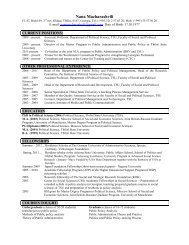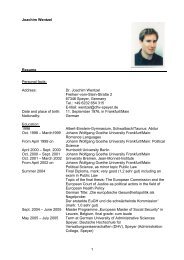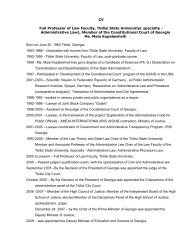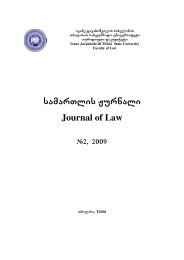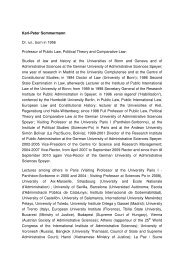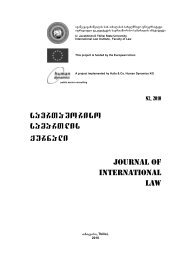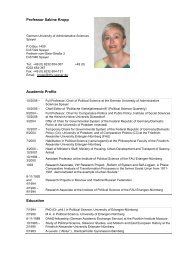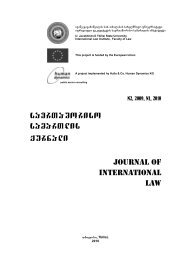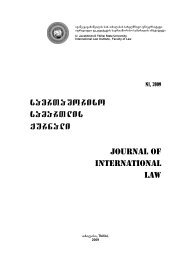Untitled
Untitled
Untitled
You also want an ePaper? Increase the reach of your titles
YUMPU automatically turns print PDFs into web optimized ePapers that Google loves.
saerTaSoriso samarTlis Jurnali, #1, 2008 JOURNAL OF INTERNATIONAL LAW, N1, 2008<br />
Contrary to the requirements of the UNCRC<br />
and the UN Minimum Standars and Norms, the<br />
police, prosecutors and judges have no power<br />
to divert children from the criminal justice system<br />
into community based programmes that<br />
address offending behavior and work with the<br />
child and his/her family. The establishment of<br />
such schemes for first time offenders and repeat<br />
minor offenders would ensure that children<br />
are not taken to court for minor offences<br />
and suffer all te disadvantages that prosecution<br />
causes. It would enable children to stay<br />
with their families, in education and allow them<br />
to receive support.<br />
Rule 6 of the Beijing Rules require that<br />
decision makers should be able to exercise<br />
discretion at any stage in the criminal process,<br />
including in relation to the decision on whether<br />
to continue with an investigation or prosecution.<br />
The Rule requires that consideration<br />
should be given wherever appropriate to dealing<br />
with juvenile offenders without resorting to<br />
formal trial. In addition, Rule 10 provides that<br />
a judge or other competent body shall without<br />
delay consider the issue of release. The police<br />
do not have the discretion envisaged in<br />
the Rules. Therefore, the police should be given<br />
discretion simply not to proceed with an<br />
investigation. This does not necessarily mean<br />
ignoring the offending behavior, but taking alternative,<br />
diversionary measures to deal with<br />
offending where this is necessary. Police<br />
should be given the power either to warn a<br />
child that further offending may lead to prosecution,<br />
or to refer a child to a diversion programme<br />
that would address the child’s offending<br />
behavior.<br />
The short period of time between arrival at<br />
the police station and the start of questioning<br />
does not allow time for the parents to arrive at<br />
the police station and to be present at questioning,<br />
making this right largely meaningless.<br />
There is no system of summary trial for<br />
children who admit offences and this leads to<br />
unnecessary pre-trial detention. In other<br />
words no system by which his case can be<br />
fast-tracked and brought into the court shortly<br />
after charge for final hearing. Instead , the<br />
child must wait in the queue for his case to be<br />
heard. This is not in the child’s best interests<br />
and is not using detention as a last resort for<br />
the shortest period of time. It is also deeply<br />
ineffective and costly from resource perspective.<br />
Consolidated trials would assist the process<br />
of reducing delay and would reduce the<br />
time children spent in detention.<br />
There does not appear to be any opportunity<br />
for the teacher or the lawyer to speak<br />
to the child before the questioning begins.<br />
Thus there is no opportunity to explain why<br />
they are there, their role or what is going to<br />
happen to the child as a result of being arrested.<br />
To a great extent the protection provided<br />
by the attendance of the teacher and<br />
the lawyer is illusory. Therefore, the lawyer<br />
should be entitled to talk to his child client in<br />
private before any questioning by the police<br />
occurs.<br />
Courts are frightened and intimidating places<br />
for children facing trial who, like adults are<br />
placed in a cage in the court, away from their<br />
parents. At the outset of court hearings, judges<br />
explain the rights of the accused , but it is<br />
likely that many children fail to understand the<br />
legal language used by the judge and are not<br />
familiar with court procedure. The physical<br />
placement of the parents so far away from the<br />
child reduces the support that they are able<br />
to offer a child facing trial. In the intimidating<br />
arena of an adult court, it is vital that minors<br />
are adequately represented o ensure that their<br />
case is properly considered and that mitigating<br />
factors are presented.<br />
The Beijing Rules lay down detailed on<br />
sentencing. Any sanction imposed on a child<br />
must always be proportionate to the circumstances<br />
of the offence and also to the circumstances<br />
and the needs of the juvenile, as well<br />
as the needs of society. The best interest of<br />
the child should be the guiding principle in any<br />
decision.<br />
The Criminal Code has provisions relating<br />
to early release and parole, but these are<br />
not widely used. He court can conditionally<br />
release a juvenile sentenced to corrective labour<br />
or imprisonment before the expiration of<br />
the term if the court holds that complation of<br />
the sentence is no longer necessary for corrective<br />
purposes. Although it is encouraging<br />
to see some applications for early release, it<br />
would appear that it is rare to review the sentence<br />
of a juvenile to determine a need for<br />
custody continues to exist. The failure to review<br />
amounts to non-compliance with art. 25<br />
UNCRC, the ECHR and Rules 32.3 and 28 of<br />
the Beijing Rules.<br />
Current system of JJ provides too little discretion,<br />
flexibility and alternatives to criminal-<br />
172



